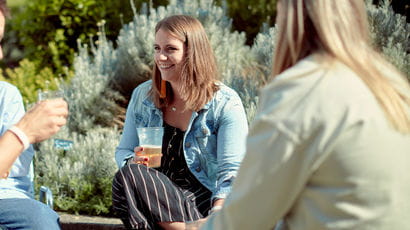Have a safe night out
Top tips to make sure you and your friends stay safe on a night out.
Bristol is well known for its great nightlife and club scene. Going on a night out with friends can be a big part of student life, and it’s important that you look after yourself when you do. The information below gives top tips to make sure you stay safe.
What you need to do
-
Step 1
- Make sure you can get home safely by having taxi apps installed on your phone or keeping your taxi money separate from your spending money.
- Make sure your phone is fully charged.
- Put ICE (in case of emergency) numbers on your phone.
- You may not notice the effects of pre-drinking until some time later, so take it steady and pace yourself throughout the night to avoid getting too drunk too quickly.
-
Step 2
- If instinct says don’t do something, then don’t. Alcohol can affect your judgment.
- Drink affects women quicker and the effects last longer than for men.
- Don't do rounds – you may feel pressured into drinking more than you want.
- If you leave before your friends – or with someone you’ve just met – let your friends know who you’re going with and where you’re going.
- Don't leave drinks unattended, as they can get spiked.
- Swap alcoholic drinks with alcohol-free drinks as this will steady the flow of alcohol and will help your hangover the next day.
- Know your limits – avoid mixing your drinks or drinking too quickly.
- Look after each other. If one of your friends gets very drunk stay with them and if they’re on the floor keep them on their side; don’t let them turn onto their back.
Top tips
- Alternating alcoholic and non-alcoholic drinks will keep you hydrated and reduce hangovers.
- When you feel good, consider stopping there. It’s easy to feel that taking or drinking more will make you feel even better, but that’s when things can start to get messy.
- Learn what works for you. Everyone is different and can get different effects from different types and amounts of drugs including different types of alcohol, and how they affect you according to your mood, health or menstrual cycle- learn what works for you and what your limits are. Avoid mixing drinks and drinking too fast.
- Do what’s best for you. Drinking in rounds means you can end up drinking more and faster and spending more than you normally would. It’s OK to opt out of rounds.
- Start the night with a bite. Make sure you eat before drinking (and keep having snacks). Stay in a group. There’s safety in numbers and you can look out for each other.
-
Step 3
- If you’re still hungry, get a takeaway and don’t try to cook at home – alcohol is a risk factor for house fires and burns.
- Drink a pint of water before going to bed to stop your body/skin dehydrating.
- Give your body a few drink-free days to recover after a heavy drinking session.
- Some people experience high levels of anxiety after drinking excessively - this is a rebound effect of the alcohol leaving your system. Drinking more will only exacerbate these feelings later on. Visit Drinkaware for all the affects on alcohol.
- Ensuring you get a good night’s sleep, eating well and doing some gentle exercise will all help reduce these feelings. You can also use the SAM app to guide you.
Alcohol and sex
Alcohol and casual sex are closely linked – think about what you actually want to do and who you want to do it with.
Look after your sexual health. Where people have sex drunk they are much less likely to discuss and use contraception and sexual infection prevention and if condoms are used, they’re less likely to be used properly.
In law, consent to sex is when someone agrees by choice and has the freedom and capacity to make that choice. If a person is unconscious or incapacitated, they are unable to consent to sex and sex without consent is assault or rape. People have the right to stop sexual activity at any point.
Helpful resources
- Late night do it right – advice on having a safe night out
- Staying healthy – UWE Bristol services and support to help you stay happy and healthy
- Wellbeing Service – counselling, mental health and specialist mentoring
You may also be interested in

Drugs and alcohol
Support and information around drugs including alcohol.
Stress, depression and anxiety
Find out what stress, anxiety and depression are and access self-help resources and other sources of support.

Sexual health
Information and support around sexual health.
Smoking
Our commitment as a smokefree campus and guidance for students wanting to quit.
